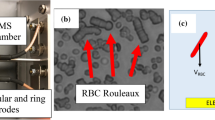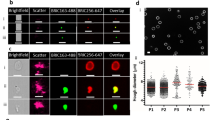Abstract
WHEN suspensions of many types of mammalian red cells in saline media are examined between a glass slide and coverslip, the cells change their shape from biconcave disks, through a stage of crenation, to spheres1. This change is associated with the removal or inactivation of an anti-sphering factor normally present in plasma albumin2.
This is a preview of subscription content, access via your institution
Access options
Subscribe to this journal
Receive 51 print issues and online access
$199.00 per year
only $3.90 per issue
Buy this article
- Purchase on Springer Link
- Instant access to full article PDF
Prices may be subject to local taxes which are calculated during checkout
Similar content being viewed by others
References
Hamburger, H. J., Pflüger's Arch., 141, 230 (1895).
Furchgott, R. F., and Ponder, E., J. Exp. Biol., 17, 117 (1940); Ponder, E., “Hemolysis and Related Phenomena” (Churchill, London, 1948).
Trotter, W. D., D.Phil. Thesis, Oxford (1954); Brit. J. Haematol. (in the press).
Robinson, D. S., Jeffries, G. H., and French, J. E., J. Exp. Physiol., 39, 165 (1954).
Author information
Authors and Affiliations
Rights and permissions
About this article
Cite this article
BARER, R., GAFFNEY, F. An Erythrocyte Sphering Factor in Rat and Mouse Plasma. Nature 177, 277–278 (1956). https://doi.org/10.1038/177277a0
Issue Date:
DOI: https://doi.org/10.1038/177277a0
Comments
By submitting a comment you agree to abide by our Terms and Community Guidelines. If you find something abusive or that does not comply with our terms or guidelines please flag it as inappropriate.



